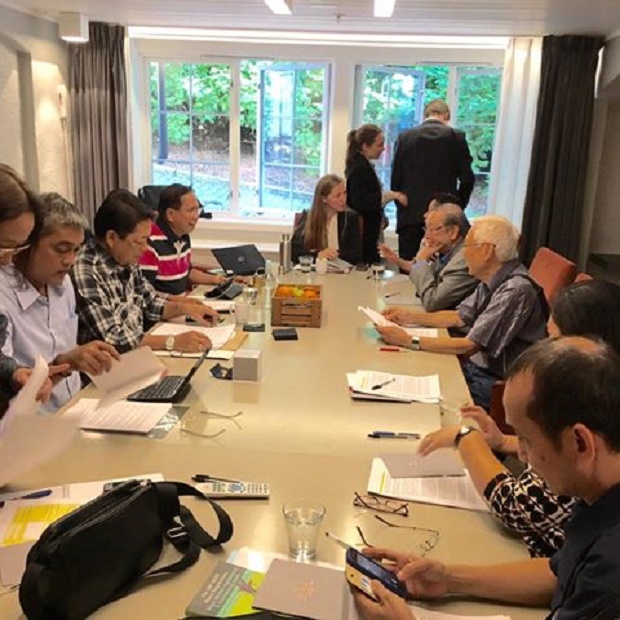
Peace talks progress between the Philippine government represented by Silvestre Bello III (third from left) and Jesus Dureza (4th from left); and the communist rebel negotiator National Democratic Front of the Philippines, represented by Jose Maria Sison (4th from right), in Oslo, Norway, in this June 2016 file photo. Photo from Jesus Dureza’s Facebook account
DAVAO CITY – The existing unilateral ceasefire declarations issued respectively by the Philippine government and communist rebel negotiator National Democratic Front of the Philippines still hold despite the two parties’ failure to meet the target deadline to craft a bilateral ceasefire agreement.
Both sides were expected to come up with a draft and ink the bilateral ceasefire agreement last October 26 as agreed upon during the first round of formal talks in Norway in August this year.
The parties initially planned to meet in Davao City for the signing of the bilateral ceasefire agreement in the presence of President Duterte.
Government peace panel chair and Labor Secretary Silvestre Bello III communicated with NDFP chief negotiator Fidel Agcaoili a proposal for the two parties to “simultaneously declare their renewed commitment to their respective unilateral indefinite ceasefire” following the lapse of the deadline.
“In response to Mr. Bello’s proposal, Mr. Agcaoili informed him that there was no need for the NDFP to make such a simultaneous declaration with the GRP,” the NDFP said in a statement.
Agcaoili said the unilateral declaration of the Central Committee of the Communist Party of the Philippines (CPP) and the National Operational Command of the New People’s Army (NPA), which was issued on August 28, would hold pending the drafting and signing of a bilateral ceasefire agreement.
The most testing parts during the second round of talks in Norway earlier this month were the discussions on amnesty, release of political prisoners and the bilateral ceasefire agreement.
The NDFP said the revolutionary movement has become apprehensive about signing a bilateral ceasefire with 434 political prisoners still inside different jails in the country.
Bello disclosed during the closing ceremony that the draft of the amnesty proclamation was already with the Office of the President and explained government procedures, including the concurrence of Congress, must be observed.
But he committed that the government would work on the immediate release of at least 81 political prisoners on humanitarian grounds. The list of 81 includes the sick, women and elderly.
“Mr. Agcaoili reminded Mr. Bello about the GRP’s commitment on the releases and amnesty proclamation of political prisoners in accordance with the Oslo Joint Statements of 15 June 2016, 26 August 2016 and 9 October 2016. He said that the fulfilment of such commitment would “serve as a big incentive towards accelerating the peace negotiations and forging a mutual stable ceasefire,” the NDFP said.
The continuing mutual trust despite the challenges is coming from the longstanding good relations of President Duterte and the revolutionary movement.
But the NDFP also expressed concern about the alleged continuing presence of the Armed Forces of the Philippines in communities supposedly performing Bayanihan programs and anti-illegal drug operations.
“However, there are persistent reports from regional NPA commands of GRP (Government of Republic of the Philippines) violations of its own unilateral ceasefire stating that AFP troops continue to make incursions into the territory of the NPA in the guise of civic action and anti-drug operations. Such military operations only serve to heighten tensions and serve as disincentive to forging a more stable bilateral ceasefire,” the NDFP said.
For NDFP consultant Porferio Tuna, the military cannot use the anti-drugs campaign as an excuse because the communist movement is already performing it even before the Duterte administration.
“Anti-criminality is part of the law and order of the organs of political power of the people’s democratic government at the base. It is not a question if there is a ceasefire or not because it is part of their task,” Tuna said.
The communist movement is known for its hardline stance against illegal drugs, having conducted raids and even meting the “death penalty” on those who are involved in the illegal drug trade inside revolutionary bases.
Tuna said the continuing implementation of the Internal Peace and Security Plan Bayanihan of the AFP has been counterproductive to the progress of the peace process.
“The conduct of Oplan Bayanihan in the last quarter during the ceasefire includes masking the nature of the operations to trick the masses and to maximize it because they know that they will not be attacked by the NPA,” Tuna said.
Tuna said that such cases were documented in at least 11 villages in North Cotabato, specifically in the towns of Arakan and Magpet where there have been alleged recruitment, training and arming of the anti-communist paramilitary group Bagani.
The Bagani caught the attention not just of local authorities but also of the United Nations for allegedly instigating the attacks, killings and massive displacements of lumad communities.
Tuna added that soldiers in several communities in Compostela Valley have been summoning farmer leaders for questioning.
Both peace panels believe that the enforcement of a bilateral ceasefire would ensure a clearer definition of hostile acts and ensure a better atmosphere to end decades of violent conflict. SFM